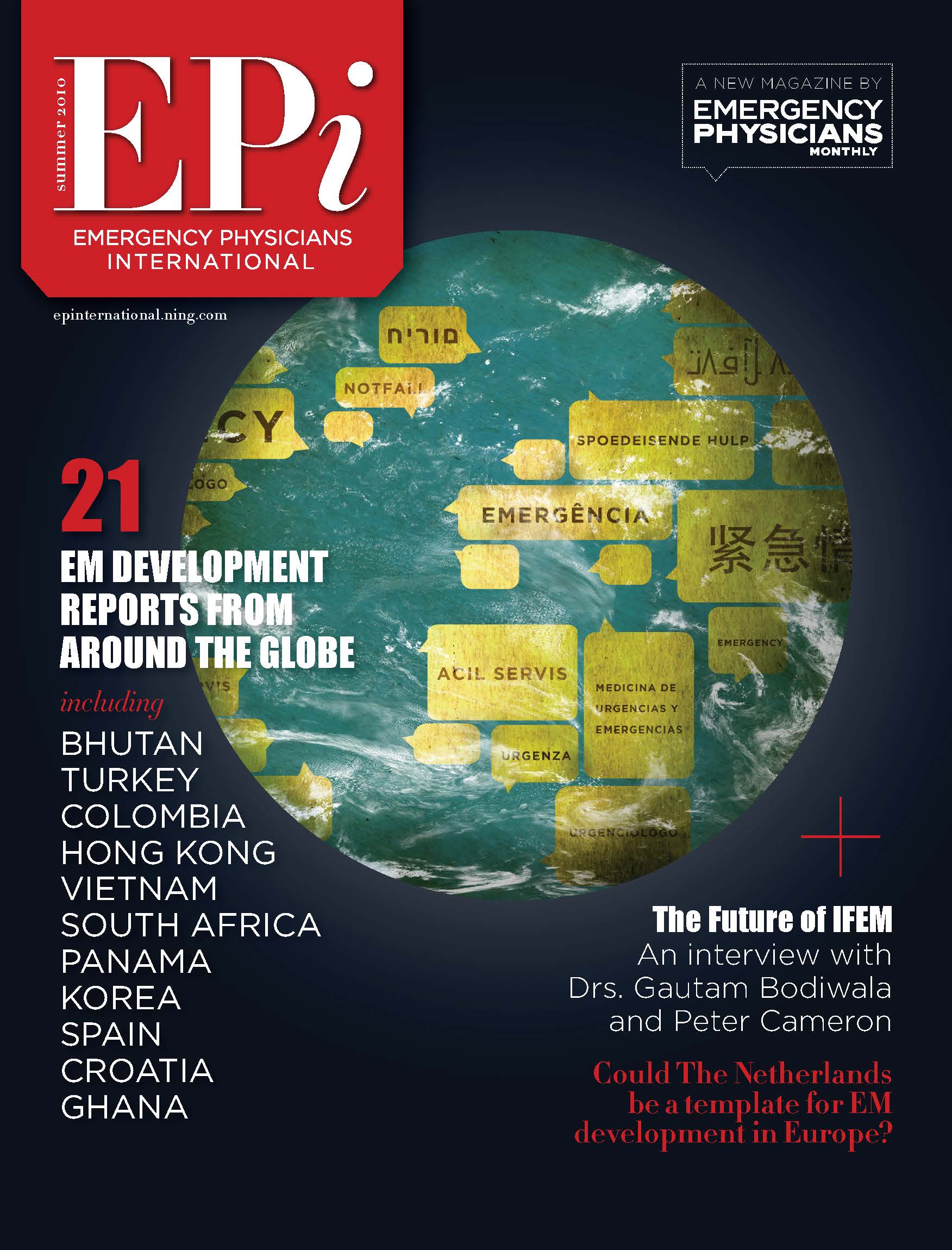ICEM22: Convenor Simon Judkins On What to Expect in Melbourne
Every year the International Federation for Emergency Medicine (IFEM) teams up with a national emergency medicine society to throw the International Conference on Emergency Medicine (ICEM). It’s a keystone event for the community and draws thousands of healthcare providers from around the world. At least that was the case until March 2020 when COVID-19 put just about every in-person conference on ice. In 2020, an ICEM planned for Argentina had to be canceled. In 2021, a largely virtual ICEM took place in Dubai. This year, from June 14-19, ICEM is attempting a comeback with a conference in Melbourne. While it will be a hybrid event, conference coordinators hope for a robust in-person event that will allow for the kind of socializing and networking that has marked ICEM over the years. To hear more about what attendees can expect in Melbourne we caught up with conference convenor Dr. Simon Judkins.
EPI: Simon, why don’t you start by telling us a bit about yourself. How did you get into emergency medicine?
Dr. Simon Judkins: The first time I went to the emergency department as a medical student there was just something about it that attracted me. And then the first shift I was actually on, working at Monash Medical Center, was just amazing. I felt like I was a part of something. Plus it was just interesting. Twenty years later I still enjoy turning up to work and interacting with patients.
EPI: You’re from Melbourne but also practice in a rural health center on the Victoria/New South Wales border. What kinds of cases are typical for that region?
Dr. Judkins: I love the challenge of rural emergency medicine because I get to see a bit of everything, from farming accidents to motorbike injuries and, of course the snakebites. Everyone who works in an Australian ED is a snakebite expert. But you also support a rural community which needs good health care.
EPI: What are your biggest hopes for ICEM 2022?
Dr. Judkins: The biggest thing is just getting everyone back together again. It’s going on two and a half years with COVID, and all the stress that’s brought on our teams and health systems. We need to get together with colleagues from around the world and not only debrief, but support each other and have a bit of fun at the same time.
EPI: Why is it so important to meet in person?
Dr. Judkins: It’s that support from colleagues, that knowledge that you’re not the only one in this. We all know that, but there’s something about getting together with colleagues who have been in the trenches – whether they’re from a hospital up the road, from another state or another country. You’ve got that common bond that brings you together. Then there are opportunities to let our hair down a little bit, have a drink, and debrief. I think that’s incredibly important.
EPI: Is ICEM including virtual programming as well?
Dr. Judkins: This is going to be a hybrid conference, so we’re going to have the live content and we’re going to be streaming all of it. We’re going to have three extra virtual plenaries and there’s also a Spanish track all of which allows us to expand our content and reach more people. We know that there are people who can take the two weeks off necessary for an international trip like this, but there are also many who cannot, for various reasons, so we want to ensure attending on-line is a great experience.
EPI: Tell us about your pricing scheme for registrants from low and middle-income countries
Dr. Judkins: We want to make the conference as accessible as we can. We’ve developed a subsidization scheme so that anyone from a low or middle-income country can get assistance. We’re fortunate to have a significant grant from the college’s foundation. We’re hoping to get that grant matched by the Department of Foreign Affairs from Australia. People can also donate to the fund when they register for the conference. We’re hoping that people from lower and middle-income countries can either get free registration or significantly subsidized. This is an idea that has been used by the Australasian Society of Emergency Medicine and ICEM in the past, but with the involvement of ACEM and the Department of Foreign Affairs, we’re essentially putting it on steroids.
EPI: What are the themes you want to hit home at ICEM?
Dr. Judkins: The official theme for the conference is Better Care for a Better World, which is very broad. What we’ve seen happen in the world over the last couple years has put emergency care services front and center. We’ve seen that whether you’re in a wealthy country or a low income country, the safety net for the community is a robust, well-supported, engaged emergency care system. If your system is high tech, but it’s not accessible to everyone in the community, then it’s going to start failing. That’s what “Better Care for a Better World” is about.
We’ve got four additional themes that run through the four days of the conference. The first is global health, then health equity, planetary health and innovation/technology.
The overall theme is that emergency care doctors and nurses do an extraordinary job. Looking at COVID, I can’t imagine what the world would be like if our EM colleagues weren’t out there doing their work. The impacts of COVID would have been much greater. So this conference is a way to celebrate what emergency medicine brings to global health.
EPI: Is there a strong focus at ICEM on system development, or is it more about day-to-day practice?
Dr. Judkins: Often the frontline emergency physician is dealing with spot fire after spot fire after spot fire. You’re just trying to keep your head above water and keep your ED going. I think the role that IFEM – and all of our colleges – can play is advocating around emergency systems and what you actually need to do to support a country that might not have robust emergency systems. Having robust emergency systems will save more lives than one person can accomplish working shifts in a hospital.
We’re trying to weave that macro view through the conference. We’ve got workshops on leadership and healthcare advocacy. Some of these lessons come from our colleagues in the South Pacific islands. They’ve advocated for health system development. We’re also bringing in experts from the World Health Organization (WHO) and experts in humanitarian response. We are focusing on a bigger picture, but we’re also incredibly aware that people just want clinical content. We’re trying to find that right balance.
EPI: Has there been a shift in focus for ICEM towards a greater emphasis on social/political issues?
Dr. Judkins: There has to be, and that’s our whole theme of “Better Care for a Better World.” In the online environment, there are plenty of ways we can access clinical information and updates. All that information is there. But we don’t often have the opportunity to talk to people and educate and support people on how you change your system. I think that’s where a conference like this can have an impact on a much broader scale. That also means linking people into networks so that they can collaborate on these issues when they return to their home countries.
The thing we’re so excited about for this ICEM is that it is a bit of a pivot point for the conference. At the height of COVID, no matter where you looked, front and center was an emergency department and an emergency care team. This conference is a unique chance to highlight that we are part of the bedrock of a robust healthcare system. And that we play a pivotal role in ensuring that everyone in a community can get access to healthcare. It often gets under-recognized and we don’t celebrate what we’ve achieved. This is an opportunity to do that, to pat each other on the back for the great work we’ve been a part of.
To learn more about ICEM22 in Melbourne, check out the official website.







